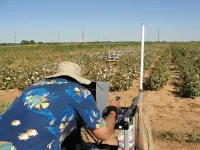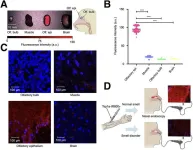(Press-News.org) Social position—defined by household income and job role—is linked to food delivery preferences in England, suggests an analysis of consumer research published in the open access journal BMJ Public Health.
Affluent households are twice as likely as less well off ones to shop online for groceries while households in lower social grades are up to twice as likely to use food delivery apps for take-away meals. And users of these apps are more likely to be living with obesity, the findings indicate.
Digital on-demand technology has rapidly and dramatically reshaped food distribution and delivery, making grocery and prepared take-away meals more accessible and convenient, and increasing the range of options available, note the researchers.
But previous research suggests that while buying groceries online is associated with healthier food choices, use of online take-away food delivery apps is rather less so. This prompted the researchers to explore the impact of the ongoing changes to food retail.
In particular, they wanted to look at the extent to which the use of online food delivery services might be informed by indicators of social position—income and job role–and whether use of these services is associated with healthy or unhealthy weight.
They accessed data from a large consumer panel previously used in the Transport for London Study, which evaluated the impact of the removal of high fat, salt, and sugar foods advertising on the Transport for London network.
This entailed analysing food and drink purchase records and a survey of a representative sample of 1521 households in London and the north of England on the method of their daily food and drink purchases and their self-reported use of food delivery apps for prepared take-away meals in February 2019.
Social position was characterised as both household income and the social grade of the household main food shopper’s job role, and classified as: high; middle-high; middle-low; and low.
Self-reported annual household income was measured in 3 bands of: £0–19,999; £20,000–49,999, and £50,000 or more.
Data on weight (BMI) were available for 1245 (82%) households, and classified as combined underweight and healthy weight below 25; overweight 25-29.9; and obese 30 and above.
Analysis of the purchase records showed that in February 2019, nearly 16% of households bought groceries online at least once; while survey responses revealed that 13% had used take-away food delivery apps in the past 7 days; and 3.5% said they had used both services.
After accounting for potentially influential household factors, such as age and composition of the residents, households with the highest incomes were twice as likely to buy groceries online as those with the lowest income. But there was no association with social grade.
And while the use of food delivery apps wasn’t associated with income, it was associated with social grade after accounting for potentially influential factors such as age, sex, and educational attainment.
Those in the lowest social grade had more than double the odds of using these apps as those in the highest; those in the middle-low social grade had 69% greater odds of doing so.
There were no associations between weight and online grocery shopping, but those who used food delivery apps were 84% more likely to be living with obesity and 45% more likely to be overweight as those who didn’t use them. Similar results were obtained after adjusting for social grade and household income.
This is an observational study, and as such, no firm conclusions about cause and effect can be drawn. And the researchers acknowledge that the survey responses reflect one point in time and rely on recall.
The analyses were also limited by the uneven distribution of households across social grade and income groups. And the sample of predominantly urban households in London and the north of England may not be fully representative of the country as a whole, they suggest.
But they say: “Our findings suggest that there are differences in use, both within and between the online grocery and online takeaway food sector.”
Although they didn’t scrutinise the content of the food and meals ordered online or by app, previously published research indicates that food delivery app use is associated with lower dietary quality and that online grocery shopping tends to be of higher dietary quality than in-store purchasing, point out the researchers.
“In the grocery sector, it has been hypothesised that a shift to online grocery shopping will occur more rapidly among affluent households, and it is possible that we observed evidence for this,” they write.
“Potentially, grocery purchasing may predominantly depend on financial resources, while take-away purchasing may be linked to culture and social group,” they suggest.
Digital food delivery apps may also make it easier to make unhealthy food choices, they say, adding: “The differential use of online food delivery services may exacerbate dietary inequalities and warrants further research.”
END
Social position linked to food delivery preferences in England
Affluent twice as likely to shop online for groceries as less well off. But households of lower social grade twice as likely to opt for take-away meals. And users of online food delivery apps more likely to be living with obesity
2024-08-21
ELSE PRESS RELEASES FROM THIS DATE:
20 minutes of mindful breathing can rapidly reduce intensity of cancer pain
2024-08-21
Twenty minutes of mindful breathing, which focuses a person’s attention on their breath, can rapidly reduce the intensity and unpleasantness of cancer pain and relieve the associated anxiety, suggest the findings of a small comparative study, published online in the journal BMJ Supportive & Palliative Care.
Mindful breathing complements traditional pain relief and broadens the repertoire of options available for cancer patients, say the researchers.
Moderate to severe pain affects an estimated 30-40% of patients with cancer worldwide, as a result of the tumour compressing or ...
Hospital bacteria tracked better than ever before with new technique
2024-08-21
Researchers have developed a new genomic technique that can track the spread of multiple superbugs in a hospital simultaneously, which could help prevent and manage common hospital infections quicker and more effectively than ever before.
The proof-of-concept study, from the Wellcome Sanger Institute, the University of Oslo, Fondazione IRCCS Policlinico San Matteo in Italy, and collaborators, details a new deep sequencing approach that captures all the common infectious bacteria in a hospital at once. Current methods culture and sequence all pathogens separately which takes longer and requires more work.
Published ...
Red and processed meat consumption associated with higher type 2 diabetes risk, study of two million people finds
2024-08-21
Meat consumption, particularly consumption of processed meat and unprocessed red meat, is associated with a higher type 2 diabetes risk, an analysis of data from 1.97 million participants, published today in The Lancet Diabetes and Endocrinology, has found.
Global meat production has increased rapidly in recent decades and meat consumption exceeds dietary guidelines in many countries. Earlier research indicated that higher intakes of processed meat and unprocessed red meat are associated with an elevated risk of type 2 diabetes, but the results have been variable and not conclusive.
Poultry ...
Environmental laws failing to slow deforestation
2024-08-21
Australia’s environmental laws are failing to stop high rates of tree clearing to make way for agriculture, development and mining, according to University of Queensland research.
PhD candidate Hannah Thomas from UQ’s School of the Environment led a team which used satellite mapping and land clearing data to analyse vegetation loss across northern Australia, including Queensland, the Northern Territory and Western Australia.
“We mapped clearing greater than 20 hectares and then investigated which national or state and territory laws were likely to apply,” Ms Thomas said.
“Of the 1.5 million hectares ...
Mother’s gut microbiome during pregnancy shapes baby’s brain development
2024-08-21
A study in mice has found that the bacteria Bifidobacterium breve in the mother’s gut during pregnancy supports healthy brain development in the fetus.
Researchers have compared the development of the fetal brain in mice whose mothers had no bacteria in their gut, to those whose mothers were given Bifidobacterium breve orally during pregnancy, but had no other bacteria in their gut.
Nutrient transport to the brain increased in fetuses of mothers given Bifidobacterium breve, and beneficial changes were also seen in other cell processes relating to growth.
Bifidobacterium breve is a ‘good bacteria’ that occurs naturally in our ...
Humpbacks are among animals who manufacture and wield tools
2024-08-21
In a study published today in Royal Society Open Science, researchers at the Marine Mammal Research Program (MMRP) at UH Hawaiʻi Institute of Marine Biology (HIMB) and Alaska Whale Foundation (AWF) consider a new designation of the humpback whales they study: tool wielders. Researchers have known that humpback whales create “bubble-nets” to hunt, but they have learned that the animals don’t just create the bubble-nets; they manipulate this unique tool in a variety of ways to maximize their food intake in Alaskan feeding grounds. This novel research demystifies a behavior key to the whales’ survival and offers a compelling case for including humpbacks among the rare ...
UTA federal research expenditures doubled in 2023
2024-08-20
In 2023, federally sponsored research at The University of Texas at Arlington accounted for $77 million in expenditures, with about $40.7 million spent on research-related goods and services in Texas. That more than doubles the total for 2022, when federally sponsored research at UTA contributed $38 million to the economy.
The $77 million is a portion of UTA’s $122 million in total research expenditures from all sources last year. This number includes federally sponsored research awards as well as those from local and state governments, private institutions, and other sources. Overall, UT Arlington and its 270,000 alumni contribute $29 billion ...
Researchers teaching artificial intelligence about frustration in protein folding
2024-08-20
Scientists have found a new way to predict how proteins change their shape when they function, which is important for understanding how they work in living systems. While recent artificial intelligence (AI) technology has made it possible to predict what proteins look like in their resting state, figuring out how they move is still challenging because there is not enough direct data from experiments on protein motions to train the neural networks.
In a new study published in the Proceedings of the National Academy of Sciences on Aug.20, ...
Novel molecular imaging tool objectively measures and diagnoses smell disorders
2024-08-20
Reston, VA (August 20, 2024) -- A new fluorescent imaging probe can for the first time objectively and non-invasively measure loss of smell, clinically known as anosmia. Targeting the olfactory nerve, the new tool has potential to eliminate biopsies used to diagnose certain anosmia conditions and to aid in the development of therapeutic interventions. This research was published in the August issue of The Journal of Nuclear Medicine.
Research shows that an estimated 13.3 million adults in the United States have a vast range of smell disorders and that ...
Tiny killers: How autoantibodies attack the heart in lupus patients
2024-08-20
New York, NY—August 20, 2024—Cardiovascular disease is the leading cause of death in patients suffering from lupus, an autoimmune disease in which our immune system attacks our own tissues and organs, the heart, blood, lung, joints, brain, and skin. Lupus myocarditis--inflammation of the heart muscle-- can be very serious because the inflammation alters the regularity of the rhythm and strength of the heartbeat. However, the mechanisms underlying this complex disease are poorly understood and difficult to study.
A long-standing question about lupus is why some patients develop myocarditis while others remain unaffected. And why the clinical manifestations of affected ...
LAST 30 PRESS RELEASES:
ASU researchers to lead AAAS panel on water insecurity in the United States
ASU professor Anne Stone to present at AAAS Conference in Phoenix on ancient origins of modern disease
Proposals for exploring viruses and skin as the next experimental quantum frontiers share US$30,000 science award
ASU researchers showcase scalable tech solutions for older adults living alone with cognitive decline at AAAS 2026
Scientists identify smooth regional trends in fruit fly survival strategies
Antipathy toward snakes? Your parents likely talked you into that at an early age
Sylvester Cancer Tip Sheet for Feb. 2026
Online exposure to medical misinformation concentrated among older adults
Telehealth improves access to genetic services for adult survivors of childhood cancers
Outdated mortality benchmarks risk missing early signs of famine and delay recognizing mass starvation
Newly discovered bacterium converts carbon dioxide into chemicals using electricity
Flipping and reversing mini-proteins could improve disease treatment
Scientists reveal major hidden source of atmospheric nitrogen pollution in fragile lake basin
Biochar emerges as a powerful tool for soil carbon neutrality and climate mitigation
Tiny cell messengers show big promise for safer protein and gene delivery
AMS releases statement regarding the decision to rescind EPA’s 2009 Endangerment Finding
Parents’ alcohol and drug use influences their children’s consumption, research shows
Modular assembly of chiral nitrogen-bridged rings achieved by palladium-catalyzed diastereoselective and enantioselective cascade cyclization reactions
Promoting civic engagement
AMS Science Preview: Hurricane slowdown, school snow days
Deforestation in the Amazon raises the surface temperature by 3 °C during the dry season
Model more accurately maps the impact of frost on corn crops
How did humans develop sharp vision? Lab-grown retinas show likely answer
Sour grapes? Taste, experience of sour foods depends on individual consumer
At AAAS, professor Krystal Tsosie argues the future of science must be Indigenous-led
From the lab to the living room: Decoding Parkinson’s patients movements in the real world
Research advances in porous materials, as highlighted in the 2025 Nobel Prize in Chemistry
Sally C. Morton, executive vice president of ASU Knowledge Enterprise, presents a bold and practical framework for moving research from discovery to real-world impact
Biochemical parameters in patients with diabetic nephropathy versus individuals with diabetes alone, non-diabetic nephropathy, and healthy controls
Muscular strength and mortality in women ages 63 to 99
[Press-News.org] Social position linked to food delivery preferences in EnglandAffluent twice as likely to shop online for groceries as less well off. But households of lower social grade twice as likely to opt for take-away meals. And users of online food delivery apps more likely to be living with obesity






